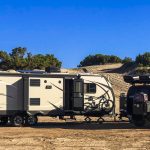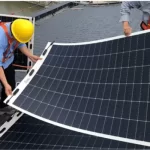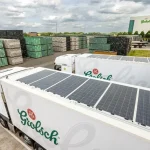Do you have any other options when going off the traditional grid? Without a backup power source, you may have to sit alone on nights when the power goes out. But the good news is that there are now many options for backup power on the market, including portable generators, solar generators, UPS, long-life rechargeable batteries, hand-cranked chargers, propane, diesel, natural gas generators, and portable solar panels.
In this article, we will discover the differences between portable solar panels and generators and which one is best for your energy needs.
What Are Generators?
Generators are devices that convert mechanical energy into electrical energy. It generates electricity by rotating a conductor and magnetic field inside the motor to produce an electric current. Generators usually use fuel (e.g. petrol, diesel, natural gas, etc.) or other energy sources to provide rotational power. They can be used to provide temporary power where electricity is required, for example during power outages, when camping, on construction sites, etc. Depending on the scenario and power requirements, the size and type of generator will vary. In addition to portable generators, there are also industrial-grade generators, standby power generators, and inverter generators. Generators play an important role in modern life, they can be used to provide electricity, guarantee power stability, and provide backup power for many critical installations.
Advantages:
- More stable power supply not affected by external factors
- All-day power supply when fuel is available
- A wide range of sizes and powers to choose from
- More affordable than solar panels for short-term use
Disadvantages:
- Noisy operation
- High maintenance costs
- High fuel consumption and not environmentally friendly
- Polluting gases and unpleasant odors are produced during the power generation process
What Are Portable Solar Panels?
Portable solar panels are portable devices that use solar panels to convert sunlight into electricity. It usually consists of multiple solar panels that can be folded or carried lightly for outdoor use. The solar panel absorbs sunlight and converts it into direct current energy, which is then stored in a battery via a charger and eventually used to charge electronic devices or provide other power needs. These portable solar panels are often used for camping, safaris, travel, outdoor work, or emergencies, they are convenient, environmentally friendly, and economical. Sungold portable solar panels are available in a variety of looks and wattages.
Advantages
- Long service life
- Access to subsidies and incentive grants
- Virtually no maintenance and installation costs
- Continuous storage of electricity for greater long-term efficiency
- Clean energy: no noise, exhaust fumes, fuel consumption, etc.
Disadvantages
- Relatively slower charging rate
- Limited by weather conditions
- Higher upfront investment costs

Applicable Groups
Generators are suitable for emergency power supply. If your daily life is based on grid electricity and you can tolerate the noise and exhaust generated during fuel change and use, you can choose a generator as a temporary backup power source.
For those who want a quiet, environmentally friendly, and clean environment, Sungold Portable Solar panels offer a low-maintenance, low daily consumption, reliable, and environmentally friendly solution. In addition to emergency use, portable solar panels can also be connected to the grid to reduce daily electricity bills and reduce idle time when in continuous operation.
Summary
While generators provide a faster power supply due to the use of fuel, they also bring with them problems of noise and exhaust fumes. Clean, quiet, and exhaust-free portable solar panels are the most reliable long-term solution. If you would like to find out more about portable solar panels, you can find out more from Sungold.








